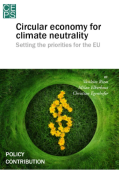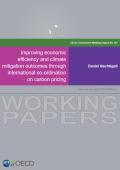
This Policy Brief looks at how circular economy can support EU climate policy, emphasizing that circular economy is more than just another ‘product standards’ policy. It calls for a framework that is able to systematically address trade-offs, a mechanism to steer and monitor progress, and the need to develop and then scale up successful products and processes to create opportunities for new value chains while addressing risks, such as dependency on raw materials.
The Key Indicators for Asia and the Pacific 2019, the 50th edition of this series, presents the latest statistics on a comprehensive set of economic, financial, social, environmental, and SDG indicators for the 49 regional members of the Asian Development Bank (ADB).
This report, Driving Finance Today for the Climate Resilient Society of Tomorrow, reviews barriers and opportunities for financing resilience and adaptation by all actors across the financial system but chiefly targets financial system constituents, including policymakers and financial actors, and the actions required of each.
The Shifting Perceptions: ESG, credit risk and ratings - Part 1- the state of play report looks at why ESG factors matter in credit risk analysis, what investors and credit-rating agencies (CRAs) are currently doing on this front, and what their expectations are.

This working paper, Improving Economic Efficiency and Climate Mitigation Outcomes Through International Co-ordination on Carbon Pricing presents the potential benefits and challenges of enhanced international co-ordination on carbon pricing and outlines the different types and levels of co-ordination that are available for national and sub-national governments.
